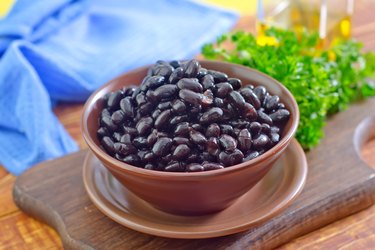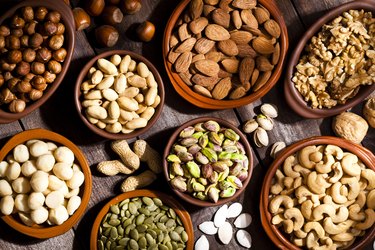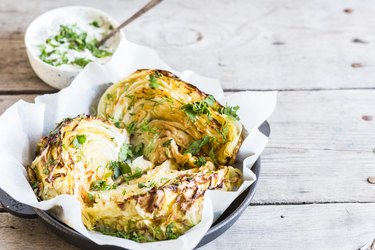Your body needs inositol, also known as vitamin B8 (though it's not actually a vitamin), in small amounts to stay healthy and function properly, per the National Institutes of Health (NIH). Specifically, inositol aids in energy metabolism and supports your brain health, per the Cleveland Clinic. D-chiro-inositol and myo-inositol are two forms of inositol, per a July 2016 study in the International Journal of Endocrinology.
The brain, heart and eye lens have the highest concentrations of inositol, though it's distributed in all body tissues, per the Canadian Academy of Sports Nutrition. Caffeine can deplete it, potentially causing inositol deficiency.
Video of the Day
Video of the Day
Inositol is currently being studied for cancer prevention, per the NIH. Other inositol benefits still under research include helping with anxiety and depression, gestational diabetes, infertility, metabolic syndrome and polycystic ovary syndrome (PCOS), per Beth Israel Lahey Health.
However, always check with your doctor before starting a new supplement (and ask your doctor for guidance if you're interested in eating more inositol foods for PCOS). You're likely already eating plenty of vitamin B8-rich foods, such as the ones listed below.
How Much Inositol Do You Need?
There is no recommended daily amount for inositol. It’s often found in multivitamin products, but your body also produces it on its own and you get it through foods high in inositol, per an October 2017 study in the International Journal of Molecular Sciences.
1. Beans

Beans are one of the best foods high in d-chiro-inositol, per a classic September 1980 study in The American Journal of Clinical Nutrition. They're also a fantastic source of heart-healthy fiber, with 9.6 grams per ½ cup cooked.
2. Peas
Peas are one of the top foods with inositol, per the NIH. Green peas are a healthy choice for a dinner side, with 4.3 grams of protein and 4.4 grams of fiber per ½ cup cooked.
3. Brown Rice
Brown rice is another healthy source of inositol, per the NIH. It also provides 43 percent of the daily value (DV) for manganese, an essential nutrient that plays a role in antioxidant function, metabolism, bone and cartilage formation and wound healing, per the Oregon State University Linus Pauling Institute.
4. Wheat Bran
Wheat bran is a good source of inositol, per the NIH. Adding a few tablespoons of unprocessed wheat bran to your favorite cereal (and topping it with berries) is a great way to fit more fiber into your diet, per the Mayo Clinic.
Doing so can help normalize bowel movements, maintain bowel health, lower your cholesterol, regulate blood sugar and maintain a healthy weight.
5. Nuts

Nuts are another food high in inositol, per The American Journal of Clinical Nutrition study. Including nuts in your diet, in general, is a healthy choice: Low intake of nuts and seeds was associated with 8.5 percent of adult diet-related deaths caused by heart disease, type 2 diabetes and stroke in a March 2017 study in The Journal of the American Medical Association.
6. Cantaloupe
Cantaloupe is a healthy food source of inositol, per the Canadian Academy of Sports Nutrition. It also comes with the healthy perk of providing 72 percent of the DV for vitamin C per cup. Citrus fruits — with the exception of lemon — are also good sources of inositol.
7. Bananas
Bananas are another source of inositol, per the Canadian Academy of Sports Nutrition. In general, fruits were a top source of this compound in The American Journal of Clinical Nutrition study. One large banana also provides 10 percent of the DV for potassium.
8. Raisins
Raisins are another inositol food, per the Canadian Academy of Sports Nutrition. Just ½ cup of dried fruit like raisins counts as one serving of fruit and can count toward your 1 ½ to two cups of fruit per day, according to the USDA.
9. Cabbage

Cabbage is another good source of inositol, per the Canadian Academy of Sports Nutrition. In general, fresh vegetables and fruits were found to contain more inositol than frozen or canned products in The American Journal of Clinical Nutrition study.
One cup of cabbage provides 56 percent of the DV for vitamin K, which is important for blood clotting and healthy bones, per the NIH.
10. Liver
It may not be top on your list for dinner, but liver is a good source of inositol, per the Canadian Academy of Sports Nutrition. Liver is also an incredible source of vitamin B12, packing 3,035 percent of the DV per 3 ounces cooked.
Vitamin B12 is important for keeping your body's nerve and blood cells healthy, according to the NIH.
Tip
Keep in mind that ultra-processed foods may lose inositol through their manufacturing process. This is important to remember when choosing foods to up your inositol levels. Talk to your doctor or a registered dietitian if you're unsure of which foods to incorporate.
- National Institutes of Health: "Inositol"
- Canadian Academy of Sports Nutrition: "Vitamin B8 (Inositol)"
- Beth Israel Lahey Health Winchester Hospital: "Inositol"
- International Journal of Molecular Sciences: "Nutritional and Acquired Deficiencies in Inositol Bioavailability. Correlations with Metabolic Disorders"
- International Journal of Endocrinology: "A Combined Therapy with Myo-Inositol and D-Chiro-Inositol Improves Endocrine Parameters and Insulin Resistance in PCOS Young Overweight Women"
- The American Journal of Clinical Nutrition: "Myo-inositol content of common foods: development of a high-myo-inositol diet"
- MyFoodData: "Navy Beans"
- MyFoodData: "Cooked Green Peas"
- Oregon State University Linus Pauling Institute Micronutrient Information Center: "Manganese"
- Mayo Clinic: "High-fiber diet"
- The Journal of the American Medical Association: "Association Between Dietary Factors and Mortality From Heart Disease, Stroke, and Type 2 Diabetes in the United States"
- MyFoodData: "Cantaloupe Melons"
- MyFoodData: "Bananas"
- U.S. Department of Agriculture: "Fruits"
- MyFoodData: "Cabbage"
- MyFoodData: "Vitamin K"
- MyFoodData: "Lamb Liver (Cooked)"
- National Institutes of Health: "Vitamin B12"
- Cleveland Clinic: "Inositol"